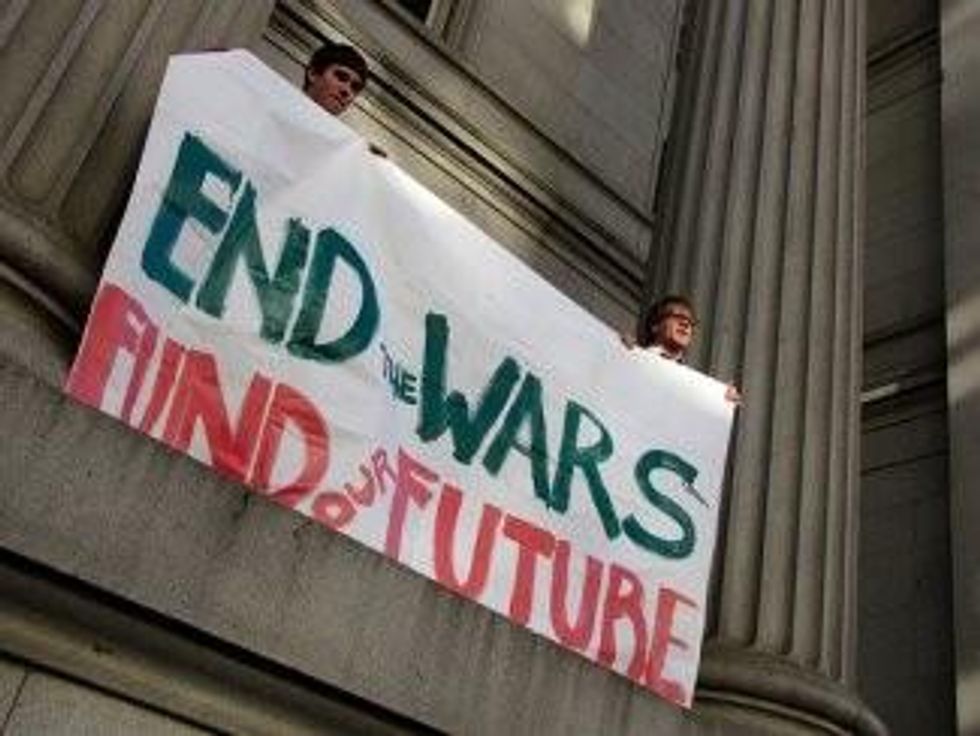What if we had politicians who believed in the abolition of war with as much passion as the Republican right believes in the abolition of taxes?
For me, the question that immediately follows is: What kind of politics draws power from resources other than the deep pockets of billionaires? Just because the world is sick of war, how will that ever translate into serious political action to defund standing armies and ongoing weapons research? How will it ever cohere into a consensus that has political traction? Does
Washington, D.C. only have room for one consensus?
For the Democrats to stand moderately tough against GOP right-wing zealots in defense of the Affordable Care Act, Medicare and Social Security, there's no way they could also -- even if they wanted to -- stand tough on, let us say, nuclear disarmament or a movement toward demilitarization. Such concepts aren't on or anywhere near the fabled "table" of national debate; they're as marginalized as segregated restrooms. This is a deep problem from the point of view of anyone looking clear-eyed into the future.
"'They were all dying,' she said, 'and there was no medicine, and there was nothing we could do.'"
The speaker is 82-year-old Kono Kyomi, one of the "Hibakusha," or survivors of the atomic blasts that leveled Hiroshima and Nagasaki in 1945, quoted by the Rev. John Dear. She was part of a delegation of survivors who came to the United States last August to commemorate the anniversary of those blasts and speak of their experiences. Their visit included a trip to Los Alamos, N.M., where the Hiroshima bomb was built and still the center of the country's ongoing nuclear weapons research and production.
Dear, a long-time peace activist who traveled with the Hibakusha delegation during their visit, described the moment Kyomi looked him in the eye during a church dinner in Santa Fe: "Be sure to speak to young people," she said. "We need to tell them the stories, to tell them about these weapons, and to educate them to work to get rid of them. That's the most important thing we can do for the future."
Nukes and militarism are done deals at the official level, uncontroversial, off the table, forever funded. This message can resonate at a church basement potluck, but I no longer have the least bit of faith it has the force to penetrate our national political fortress. Nukes and militarism are done deals at the official level, uncontroversial, off the table, forever funded. The military-industrial complex has no serious opponents. It seems to have won the war for our future, limited as that future might be because of it.
What fascinates me is how recently this was not the case. Consider, for instance, the criticism that so frequently, these days, swirls around the Nobel Peace Prize committee and its choice of winners. This year the prize was awarded to the Organisation for the Prohibition of Chemical Weapons, a watchdog group that had its spirit broken more than a decade ago, critics say. That was when the Bush administration succeeded in ousting its then-director general, Jose Bustani, whose plans to inspect Iraq's chemical weapons put the U.S. case against Saddam Hussein-- and the pending invasion of Iraq -- in jeopardy.
"The subsequent OPCW leadership has been far weaker and more averse to challenging great power prerogatives, as indicated by the fact that they are currently in the process of eliminating Syria's chemical weapons arsenal while the vast stockpiles belonging to U.S. allies Israel and Egypt remain intact," Middle East scholar Stephen Zunes said after the Peace Prize winner was announced.
And Fredrik Heffermehl, author of The Nobel Peace Prize: What Nobel Really Wanted, called the 2013 award half-hearted. Alfred Nobel's vision, he said, was "to abolish not only certain weapons, like the chemical, but all weapons in all countries. Demilitarize international relations -- not only civilize war but abolish it."
Michael Parenti, lamenting the committee's decision in 2012 to award the Peace Prize to the European Union, quoted from Nobel's 1895 will specifying the prize be given "to the person who shall have done the most or the best work for fraternity between nations, for the abolition or reduction of standing armies and for the holding and promotion of peace congresses."
I repeat: "Demilitarize international relations -- not only civilize war but abolish it." This was a real goal a century ago, a glowing possibility. And even 50 years ago, it remained so.
John F. Kennedy, announcing that talks on a Nuclear Test-Ban Treaty with the Soviet Union had begun, declared: "Our primary long range interest in Geneva, however, is general and complete disarmament . . . permitting parallel political developments to build the new institutions of peace which would take the place of arms. . . .
"While we proceed to safeguard our national interests, let us also safeguard human interests. And the elimination of war and arms is clearly in the interest of both."
This was once a goal of nations, a goal of wealth. It had credibility and presence at the highest levels. Now it has vanished. Bitterly cherished as this goal may still be among ordinary humanity, the governing classes have decreed: The next war is coming.
The time has come not to believe them. The time has come to return disarmament to the political agenda. The time has come to refuse to make peace with war.
____________________




